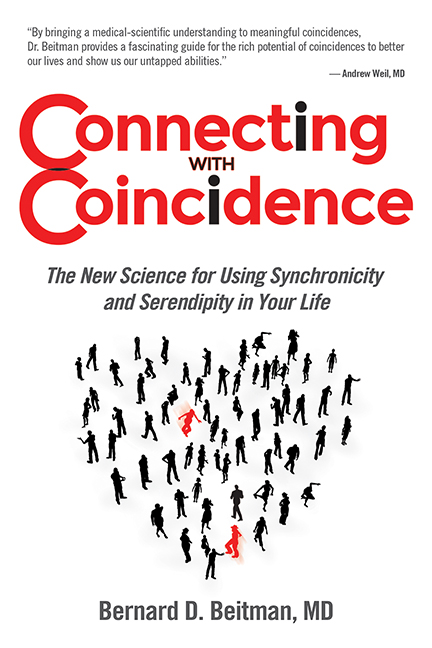Bernard Beitman, a visiting professor of psychiatry at the University of Virginia, and author of Connecting with Coincidence, blogs for Psychology Today on coincidence and synchronicity. In his latest post, he discusses the most common coincidences he has found in his research. These were taken from 1,551 responses to his weird coincidence survey. From the PT post:
I think of a question only to have it answered by an external source (i.e. radio, TV, or other people) before I can ask it.
I think of an idea and hear or see it on the radio, TV, or Internet.
I think of calling someone, only to have that person unexpectedly call me.
I advance in my work/career/education by being in the right place at the right time.
In descending order of frequency, the rest of the items lined up like this:
I need something, and the need is then met without my having to do anything.
I am introduced to people who unexpectedly further my work/career.
I run into a friend in an out-of-the-way place.
When my phone rings, I know who is calling without checking the screen or using personalized ring tones.
Meaningful coincidence helps determine my educational path.
I think about someone and then that person unexpectedly drops by my house or office, or passes me in the hall or street.
I experience strong emotions or physical sensations that were simultaneously experienced at a distance by someone I love
After experiencing meaningful coincidence, I analyze the meaning of my experience.
In an email, Bernard mentioned this post had gotten 2,500 hits in a week and he wasn’t sure why. He did some sleuthing and discovered that The Guardian had done a piece on his book. It’s by Oliver Burkeman and employs some of the usual tactics that skeptics use when they talk about synchronicity or anything else that can’t be explained by mainstream science.
He begins with a story in Beitman’s book about a British soldier fighting in Italy who is knocked unconscious by shell fragments. That same day in Monmouthshire, his wife was cleaning up after lunch and his daughter, two and a half, “to whom I was only a name,” suddenly went over to her mother and announced that daddy had been hurt.
Burkeman’s take: “The rationalist in me knows this all comes down to the “law of truly large numbers”, which states that, given a large enough sample, many seemingly unlikely things become downright probable. Even assuming the soldier’s memories were accurate, so many fought in the second world war that it’s almost inevitable a few would have odd stories.”
He goes on to mention another story that Beitman relates in his book, about a therapist who dreamed of an ex-patient lying immobile in a beach hut. A week later, he found out that the patient had taken an overdose in a seaside hotel and nearly died. “Spooky!” Burkeman writes. “But less so when you factor in the patients the therapist didn’t dream about – not to mention all the other therapists with no such anecdotes to relate.”
This last sentence is straight out of the skeptics’ playbook and one that Michael Shermer, founder of Skeptic magazine, uses frequently, as in this story. The punch line here is that Shermer ran into his agent, Scott, in Portland, Oregon, a city they both happened to be visiting.
“We were stunned,” Shermer writes. “It sure seemed like something more than a coincidence, and we both joked about how there must be some sort of scheduling god who makes these things happen.
“But Scott and I are good skeptics. We know how to think about such events. Even though such coincidences as this really stand out as unusual—and they are when I describe it in this manner—most people forget to consider all the other possibilities: the thousands of people I know who didn’t happen by that diner, the delay at the diner talking to Scott when I might have left earlier and had something else unusual happen that now didn’t, all the other cities I’ve traveled to and dined in when I didn’t see anyone I knew, and so on. And the same for Scott: he has hundreds of clients and knows thousands of people in the lecture business, any one of which he would ever happen to bump into in any given city he happened to travel to, would stand out as unusual.”
See the parallels? What’s humorous, though, is that Burkeman has trouble dismissing it all because Beitman is a psychiatrist, the first since Jung to take a serious look at synchronicity. “Still, Beitman makes an intriguing case for approaching coincidences as if they weren’t just random, whatever your beliefs. Connecting With Coincidence is full of people taking such happenings as “signs”, telling them who to marry, whether to have kids or get divorced – and it serves them rather well.”
However, there’s an upside to all this. Beitman’s website got 650 hits on the day the article in The Guardian was posted. So even publicity generated by a skeptic is good for the sale of books!
HAPPY JULY 4TH!










I experience both coincidences and synchronicities. Somehow when can tell the difference between them.
I go with synchronicity, not by “coincidence”, as coincidence simply does not and cannot explain or apply to many instances of synchros that happen in my own life. An example: In my entire life, my breasts have never hurt. It’s very common with women, but not at all, ever, with me, except twice. Never during my monthly cycles; never during my three pregnancies. but in February of 1987, for no apparent reason, my left breast began to hurt, A LOT. I was finally on the verge of seeing my doctor about it when I received a phone call from my sister in MO. She had had her left breast removed, a total mastectomy for cancer, (which had been diagnosed three days prior to the surgery, on February 14th, and hadn’t told me). As soon as I learned about her situation, my left breast pain went away. She said she didn’t tell me about it until afterwards because she knew it would worry me terribly. The following year, my RIGHT breast began to hurt in exactly the same manner as previously. But THIS time, I called my sister immediately, and surely enough, she was preparing to have a total mastectomy on her RIGHT breast for cancer. My pain disappeared. Coincidence? NO WAY!!!!!!! Thank goodness, she has been cancer-free since then. But ‘coincidence’ cannot explain this circumstance between my sister and me. Synchronicity? Yes.
I bought this book, too. I put it on my Kindle, perused it and decided to come back and read it later. That was two or three weeks ago. Yesterday, I picked up the book and began to read it, and here you write about it today. 🙂
Aaaah, signs. Been on my mind a lot lately. I go with synchronicity, coincidence just does not feel right.